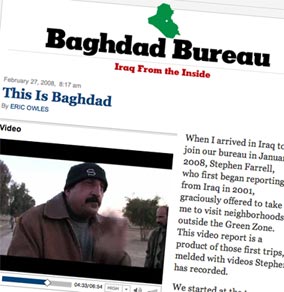We give developers the opportunity to tell us journalists why we should sit up and pay attention to the sites and devices they are working on. Today it’s live blogging with difference, with an interactive community, through CoveritLive.

1) Who are you and what’s it all about?
I’m Keith McSpurren, president of CoveritLive, which is what we call ‘live blogging 2.0’. It evolves live blogging from an interesting recap into an engaging event.
We have added interactivity features to live blogging, like polling questions and reader Q&A to involve the audience more.
We also made it simple for journalists to pull in rich multimedia (video, pictures, audio and even advertising) to create an event worth sticking around for.
Humbly, we think we are forging a new form of journalism.
2) Why would this be useful to a journalist?
People look to journalists for information and perspective. We believe there are many instances where getting that as events unfold is better than after the event is over.
Instead of reading an article about The Oscars or a Q&A session in Parliament for a few minutes the next day, why not get running commentary in real time from your favourite writers?
Why not have the chance for readers to ask questions or add to the conversation or answer polling questions as well as draw upon the multimedia readily available on the web during the event?
These are all good ideas but the real benefit of CoveritLive to the journalist is that we believe we have made it possible to do all of this without the need for the IT department or any technical training.
The ease of implementation and use is really what gets writers excited when they first try it out.
3) Is this it, or is there more to come?
CoveritLive is the first piece of software in the world to focus on live blogging. This is an evolving form of journalism and we listen very carefully to our users to develop better features all the time.
For example, next week we will launch a feature we call ‘Panel Discussion’ which will allow writers to have up to ten other writers all in the same live blog. Great for Q&A sessions, particularly with people who are spread out around the world.
Imagine the foreign correspondent in Baghdad online with the political reporter and two guests…without needing anyone to ‘set it up’ for them.
Cobbling together other expensive technology can do this kind of thing but by making it easy to do, we expect these kinds of features to grow the field of live blog reporting.
In the same way cheap, easy to use blogging software created a new form of reporting, we hope to do this where ‘live and in-depth’ is important.
4) Why are you doing this?
CiL is a commercial venture so we most definitely have a profit motive. That said the idea came around because I felt (after watching far too much television and yelling at it) that “there is more to be said”.
We think, with the right software, journalists can make their coverage better or add to what I’m watching on television. Politics, sports, financial news, conferences and even education are all areas where easy to use, low cost software can help the people who cover it.
5) What does it cost to use it?
The software is free to use. This sometimes has an unintended impact where larger news organisations think, “It’s free. It must not be very good or be able to handle someone big like us.”
That could not be farther from the truth. It’s free because we are trying to lead the way with our users towards a new form of reporting. Putting price as a barrier to trial is not a good idea.
6) How will you make it pay?
We think our software creates significant opportunities for our users in terms of engaging their readers for long periods of time during a live blog.
Some recent data from an NFL football blog using CoveritLive demonstrates my point:
- Unique viewers: 2750
- Average duration on the live blog: 62 minutes
- Percentage of readers 30 minutes or more: 51% (or over 1300 readers)
- Number of Instant Replays clicked to view after the live blog: 4700
These kind of numbers create huge advertising opportunities for users interested in that type of thing.
We expect that value is worth paying for at some point once we have proven to be the software of choice in this new category.
Additionally, advertising supported software is a proven business model that will be more appropriate for micro-niche bloggers/writers who get the benefit of enterprise class software at no cost.
All this said, we are focused solely on being responsive to our users and growing usage. Revenue will follow good ideas.

